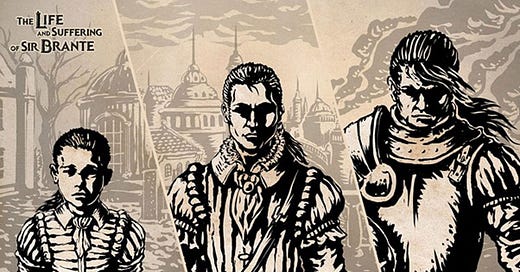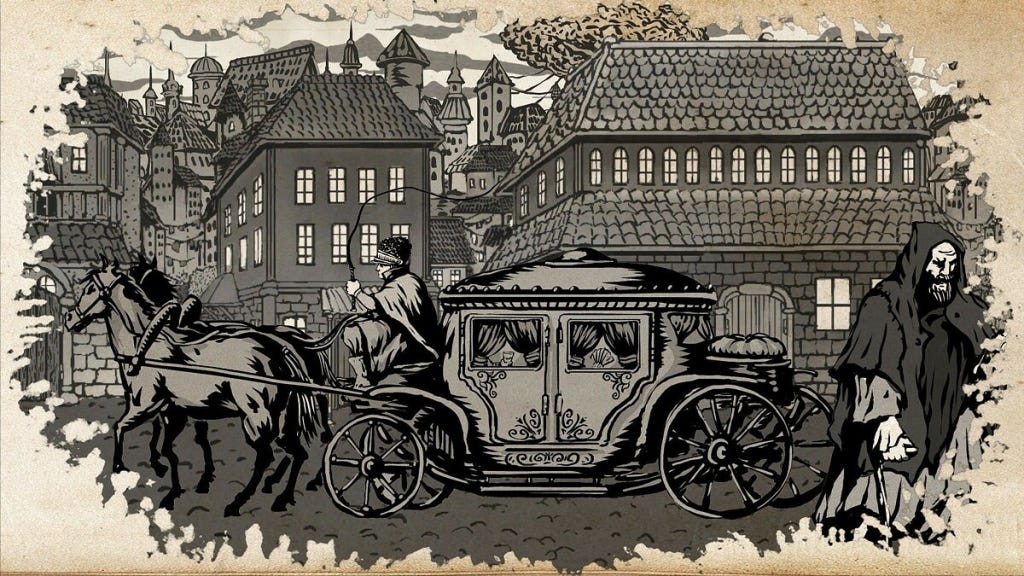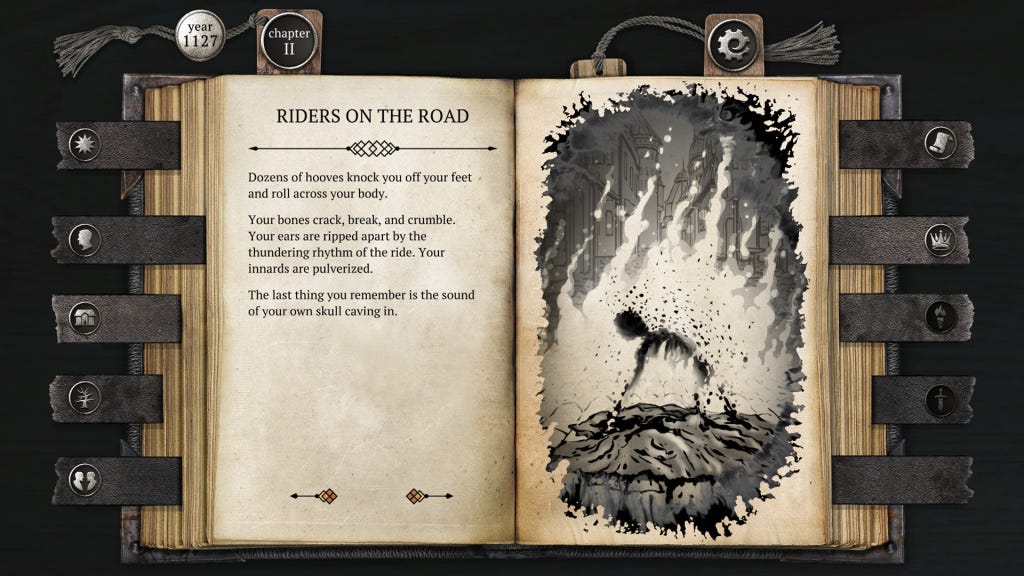The Life and Suffering of Sir Brante, Dumezil's favorite Russian gamebook
Developer: Sever
Publisher: 101XP
Director: Dmitry Ivanov
Scenario: Fyodor Slusarchuk
Character Design: Anton Kolomiets
Soundtrack: Vasily Kashnikov, Fyodor Trubin
Subgenre: Gamebook-like RPG with multiple choices and paths opened up depending on stats and events triggers
Progression: the game is divided in five parts (though you can die before experiencing all of them) but, as the protagonist grows and the impact of his choices becomes more apparent, each chapter can get wildly different, same as Brante's ultimate fate
Developer’s country: Russian Federation
Platform: PC, PS4, XBO
Release Date: 4\3\2021
Status: Completed on 19\8\2022
Growing up as a kid in the late '80s and early '90s, one common feature of book stores in my country was the ever-present stack of fascinating Gamebooks, which promised young readers an enticing mix between a fantasy book and a solitary role playing experience. Despite their reliance on mechanics that often ended up being ignored, their proclivity to spoilers and their extremely diverse quality both in terms of writing, world building, real choices and art direction, this mostly forgotten genre actually left its mark on many designers that attempted to recreate it in videogame form, remembering the glory of series like Lone Wolf (which did receive his own videogame-exclusive adventure) and his long travels throughout Magnamund, his southern counterpart Oberon the Wizard, post-apocalyptic Freeway Warrior or Fabled Lands' unique attempt at building an open world gamebook experience through many regional books you could freely mix by traveling as a single character and keeping your progress thanks to a system of keywords, not to mention plenty of others.
While most videogames trying to offer a similar experience end up choosing mechanics and interfaces reminiscent of Japanese visual novels, a powerful, if more recent, influence on western videogame developers, some teams actually end up recapturing the atmosphere of the Gamebooks of yesteryear even from an aesthetic standpoint, as is the case of The Life and Suffering of Sir Brante, developed by Russian team Sever. The Russian origin of this title is actually an important part of its identity, as Fyodor Slusarchuk, the scenario writer and director, wrote the tale of the eponymous protagonist with a sensibility that often seems to betray elements of Russian history and Orthodox thought.
While the bookpages and black and white, almost litographic illustrations by Anton Kolomiets wouldn't be out of place in a Gamebook of old, the game's mechanics are also quite a good adaptation of those experience: compared with non-simulative visual novels, whose paths are often linked with branching choices that are either free to take or linked with some sort of affinity system, The Life and Suffering of Sir Brante actually has a character sheet with parameters developed through the player's choices that, coupled with the choices themselves and the relationship with other characters, open up a slew of different interactions. Crucially, the releationship with NPCs aren't just defined by a vague affinity with the eponymous Sir Brante, but also by a description of their mental status, that contributes to define the way you can interact with them, meaning you can be friendly or hostile to a character in many different ways, making the affinity system a qualitative affair just as much as a quantitative one, a development I would love to see in more games using this kind of systems. Also, as an unique twist, the world itself has a set of growingly complex stats, reflecting the Brante family and the main political institutions' current political status.
As the title implies, this adventure covers the whole life of Sir Brante, from his birth until his death, with each chapter associated with a phase of his development. Interestingly, the character's stats also change during the story, with previous abilities contributing to the numerical pool for new skills that will replace the old ones: child Brante's Determination and Perceptions will give way to adolescent Brante's Nobility, Ingenuity and Spirituality, and then adult Brante will have a whole new set of abilities whose starting value will be decided by the combination of his childhood and adolescent skills.

Sever's opus is set in the Blessed Arknian Empire, a nation led by the elusive Arknian race that, more than a millennia ago, conquered the known world and converted humanity to the faith of the Twin Gods, whose tenets, mediated by the teachings of Saint Isatius, dictate an uncompromising adherence to the tripartition between three different classes, or Lots: commoners, nobles and priests. This society's focus on a fantastic version of Dumezil's Indoeuropean tripartition theory, itself anticipated in the 10th century by Catholic bishops Gerard of Cambrai and Adalberon of Laon, with their idea of a society divided between oratores, bellatores and laboratores (roughly speaking, priests, warriors and paesants), is one of the core themes of this game, though one would be mistaken in thinking it's the only one, or that the story's early depiction of class relationships, to borrow from Marx, means that the narrative is focused on a purely manichean depiction of Arknian society.
Faith, seen in the game both as an organized set of belief protected by the Church and as the mystical attempt to link oneself to divine trascendance, a belief that in the real world the Orthodox Church enshrined in its teachings regarding Esichasm and that is also reflected in the Russian recurring religious and literary archetype of the Fool for Christ, the yurodivy, is yet another core theme in this title's writing, especially, though not only, if your Sir Brante decides to enter the clergy (a decision that, in itself, opens up a number of strikingly diverse options). After all, despite its tone being mostly low-fantasy throughout the story, this is a world where the Twin Gods' existence is actually undisputable, both by looking at the Light Pillar shining in the sky and by another unique trait of Arknia, the gods-granted "lesser deaths" that allow each person to return to life up to three times after briefly looking at the Twins, so that anyone can be judged after their final death having had a chance to live a full life.
Interestingly, while the holy books of Isatius, Arknia's Gospels equivalent, are sparingly discussed, one of the passages, mentioned during the Sinner's Confession event, heavily references the 28th saying of the extra-canonical Gospel of Thomas, which intrigued me to no end given this is one of my favorite passages from that book.
That the Twin Gods are undisputable themselves doesn't mean their dogmas are, though: during Sir Brante's life, new theological currents with powerful social overtones will challenge the Old Faith, with the New Faith questioning Isatius' authority and the three Lot's real theological legitimacy. The growing conflict between the Old Faith and the New Faith could possibly be inspired by the Russian Orthodox Church's own schisms, like the Old Believers at the time of Tsar Alexei Mikhailovich and Patriarch Nikon, though the biggest reference is obviously to the Russian Revolution and the way it toppled both the Empire and the Church, at least until Stalin rebuilt the Soviet Union's relationship with the Orthodox faith in order to promote the Great Patriotic War against Germany. Then again, it's also kinda obvious Slusarchuk was trying to portray the Arknian version of our world's Protestant Reform. This would be kinda ironic, though, once you consider how Martin Luther firmly believed in the Three Estates as a valid paradigm for sociopolitical relationships and uncompromisingly sided with the Protestant nobles of the Holy Roman Empire against the paesants' revolts.
Led by regional Patriarchs rather than a Pope-like figure, another nod to Orthodoxy, the Twin Gods' Church is deeply intertwined with the Arknian Empire, with each one legitimising and protecting the other, a relationship that was likely inspired by the way the Patriarchs of Constantinople and then of Moscow acted towards the Eastern Roman Emperors and the Russian Tzars. In the western Catholic space, one has to look at Dante's theory of the Two Suns to see a prominent theorist putting the Pope and the Emperor on the same level, something even Ghibellines were shy to proclaim, let alone Guelphs with their attempt to demean the authority of the Holy Roman Emperor, to remove his self-proclaimed rights regarding the appointment of bishops and to subject him to the authority of the Pope. The relationship between the Arknian Church and Empire is a perfect embodiement of the "throne and altar" alliance that was theorized at different times both in the Catholic and Orthodox spaces, and ends up looking almost Confucian, with both entities contributing to a sort of Mandate of Heaven that would be destroyed by any change, something that, in turn, also evokes Cicero's concept of pax deorum, the peace between human and gods ensuring the Roman Republic's legitimacy and, indeed, its very existence through the adherence to a set of laws and rituals protected by the State.
While the three Lots are the pillars of the Empire, class mobility isn't unheard of: gifted commoners can study in order to get an imperial post and hope to become a Noble of the Mantle, after which their heirs could hope to turn the title into an hereditary one by becoming Nobles of the Sword. Also, commoners as a class are quite heterogeneous, and the richest industrialist and landowners openly promote their right to ascend to a different class, between commoner and noble, in order to protect their hybrid status, showing the birth of a bourgeois class consciousness that reminds of the Russian Empire's own States, which actually separated rural commoners and city dwellers.
This introduce the last, but by no means least, major theme of the game: family relationships. Brante is born in a family where both his grandfather, Gregor, and father, Robert, reached the status of Mantle nobles working as judges, while his elder half-brother, Stephan, is himself son of a dead noblewoman, Robert's first wife, and aspire to become a noble himself. The protagonist, in turn, is the son of his father's second wife, a commoner, which brought into the family her own daughter, Gloria, and also gave the main character a little brother, Nathan. Unsurprisingly, this create a complex relationship inside the family, with Gregor disapproving his son's second marriage and openly disrespecting his wife and her children, Stephan divided between the love for his family and his desire to please Gregor and realize his ambition and Gloria, who is torn between a family she isn't formally part of and her inability to conform to the Lot of the commoners, not to mention the protagonist himself, who has to struggle with his mixed identity while choosing whether to protect his family's noble aspirations or his mother, little brother and elder half-sister. Gregor, which is introduced in a traumatic way as a one-sided, almost flat villainous despot, is actually an interesting character, and the way Brante can develop his relationship with his grandfather stands as yet another proof of Sever's willingness to take the story in unexpected directions while according to the player a surprising amount of freedom.
While Sir Brante's childhood is decently well written, it's also the least subtle part of this work due to the cruel depiction of the Arknian aristocracy and the Three Lots system, including the ritual to mark an individual with a lashing upon his or her accession to the commoner class. It's only later on, kinda appropriately when Brante grows into an adult, that one can appreciate the game's actual openness both in terms of the sheer quantity of options given to the player and to the writing supporting each path, reflecting Brante's acceptance of wildly different mindsets depending on the Lot he ends up embracing and, crucially, on the way he acts. There are countless ways to act as a commoner, noble or priest, and even the option that initially would seem less appealing, the Old Faith supporter, is actually introduced in a convincing way and can be followed throughout without it feeling an "evil path" of sorts, especially since even what could be the most agreeable path after the early bleak presentation of the caste system, which can end up as Arknia's version of the Russian Revolution, is also problematized, instead of simply having it as a perfect option for Brante and his world. Ideology and religion, though, are far from the only main choices, as the way Brante develops his relationship toward his family and its members is also crucial in a number of ways.
Regardless of Brante's choices, his life culminates in the last chapter (provided he's able to reach it, as death of both the partial and definitive versions can strike unexpectedly), where tumultuous events slowly introduced throughout the game finally manifest themselves. Interestingly, each path you can take only shows part of the machinations and background struggles the Empire and Church face, requiring multiple playthroughs just to grasp the complexity of the situation and the way many different actors, often unwillingly, contributed to setting up the final act. This, in turn, means that the game painstakingly attempts to flesh out every faction and sub faction, showing their beliefs and bias in a way that makes them mostly believable and organic to the setting. The lore also gradually hints at a larger world than the one Brante can actually explore, making the Arknian Empire a convincing setting without drowning the player with excessive information dumps.
While there are still some questionable choices both in terms of writing, event planning and stat checks, with some initial heavy-handedness potentially ruining the first impression of a game that has much more to offer, some devastating events being very hard to counter in some paths and Brante's life being only cursory examined after the events of the final chapters, without even a simbolic amount of choices to further determine his actions, this is still a RPG rife with creativity and quality worldbuilding, and I truly hope Sever can hone the promising skills they showed us with this title with their future output.









